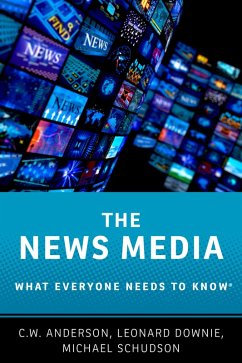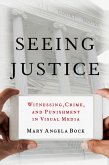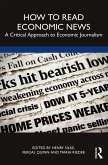The News Media (eBook, PDF)
What Everyone Needs to Know®


Alle Infos zum eBook verschenken

The News Media (eBook, PDF)
What Everyone Needs to Know®
- Format: PDF
- Merkliste
- Auf die Merkliste
- Bewerten Bewerten
- Teilen
- Produkt teilen
- Produkterinnerung
- Produkterinnerung

Hier können Sie sich einloggen

Bitte loggen Sie sich zunächst in Ihr Kundenkonto ein oder registrieren Sie sich bei bücher.de, um das eBook-Abo tolino select nutzen zu können.
The business of journalism has an extensive, storied, and often romanticized history. Newspaper reporting has long shaped the way that we see the world, played key roles in exposing scandals, and has even been alleged to influence international policy. The past several years have seen the newspaper industry in a state of crisis, with Twitter and Facebook ushering in the rise of citizen journalism and a deprofessionalization of the industry, plummeting readership and revenue, and municipal and regional papers shuttering or being absorbed into corporate behemoths. Now billionaires, most with no…mehr
- Geräte: PC
- mit Kopierschutz
- eBook Hilfe
- Größe: 5.65MB
![The Dynamics of News (eBook, PDF) The Dynamics of News (eBook, PDF)]() Richard M. PerloffThe Dynamics of News (eBook, PDF)51,95 €
Richard M. PerloffThe Dynamics of News (eBook, PDF)51,95 €![Mixed News (eBook, PDF) Mixed News (eBook, PDF)]() Mixed News (eBook, PDF)41,95 €
Mixed News (eBook, PDF)41,95 €![News (eBook, PDF) News (eBook, PDF)]() Jackie HarrisonNews (eBook, PDF)37,95 €
Jackie HarrisonNews (eBook, PDF)37,95 €![The Broadcast News Toolkit (eBook, PDF) The Broadcast News Toolkit (eBook, PDF)]() Kirsten JohnsonThe Broadcast News Toolkit (eBook, PDF)37,95 €
Kirsten JohnsonThe Broadcast News Toolkit (eBook, PDF)37,95 €![Seeing Justice (eBook, PDF) Seeing Justice (eBook, PDF)]() Mary Angela BockSeeing Justice (eBook, PDF)24,95 €
Mary Angela BockSeeing Justice (eBook, PDF)24,95 €![Changing the News (eBook, PDF) Changing the News (eBook, PDF)]() Changing the News (eBook, PDF)59,95 €
Changing the News (eBook, PDF)59,95 €![How to Read Economic News (eBook, PDF) How to Read Economic News (eBook, PDF)]() How to Read Economic News (eBook, PDF)37,95 €
How to Read Economic News (eBook, PDF)37,95 €-
-
-
Dieser Download kann aus rechtlichen Gründen nur mit Rechnungsadresse in A, B, BG, CY, CZ, D, DK, EW, E, FIN, F, GR, HR, H, IRL, I, LT, L, LR, M, NL, PL, P, R, S, SLO, SK ausgeliefert werden.
- Produktdetails
- Verlag: OUP eBook
- Seitenzahl: 224
- Erscheinungstermin: 11. August 2016
- Englisch
- ISBN-13: 9780190206215
- Artikelnr.: 48793465
- Verlag: OUP eBook
- Seitenzahl: 224
- Erscheinungstermin: 11. August 2016
- Englisch
- ISBN-13: 9780190206215
- Artikelnr.: 48793465
- Herstellerkennzeichnung Die Herstellerinformationen sind derzeit nicht verfügbar.
* PART I: THE PAST
* When and where was the world's first newspaper published?
* And the first American newspaper?
* And there was no such thing as journalism until the 1600s?
* What were early newspapers like? Who started them and why?
* And early newspapers in the American colonies?
* What does the First Amendment mean?
* How is the U.S. tradition of the free press different from traditions
in other democracies?
* How could the American founding fathers have approved the First
Amendment and also supported federal subsidies for newspapers and
also passed the Sedition Act of 1798 that made criticizing the
federal government a crime?
* Why were European visitors to the United States in the 19th century
so often astonished - and sometimes appalled - by the American press?
* How did newspapers become mass market media?
* Did Karl Marx write regularly for Horace Greeley's New York Tribune?
* Why did Abraham Lincoln spend so many hours in the telegraph office
during the Civil War?
* When was the first interview? And how did interviewing become a
standard practice in news-gathering?
* What were immigrants reading as they flocked to the United States in
the late 19th century and since?
* How did slaves and later free African-American get their news?
* Did the "yellow press" drive America into war with Spain in 1898?
* How did American newspapers, largely identified with political
parties for most of the nineteenth century, come to pride themselves
on "objectivity"?
* Is adherence to the value of "objectivity" the heart of what it means
to be a "professional" in journalism?
* If "objectivity" is not the heart of professionalism in journalism,
what (if anything) is?
* Is it true that Mark Twain, Theodore Dreiser, Stephen Crane, Willa
Cather, Ernest Hemingway and other famous novelists were all
reporters before they became famous as novelists?
* Who were the "muckrakers"?
* What kind of education did journalists typically have in the past?
When - and why - did formal course work in and schools of journalism
develop?
* What is a Pulitzer Prize?
* Is it unethical for journalists to be or to become friends with the
people they write about?
* Why did radio not kill off newspapers?
* And why did television not destroy newspapers?
* Why have many democracies invested public funds in broadcasting?
* Why is there a Freedom of Information Act - and does it do any good?
* What was New Journalism?
* Did the press uncover the Watergate scandal? (And what was the
Watergate scandal?)
* What is the legacy of "the sixties" in journalism?
* Are the terms "contextual" or "analytical" or "explanatory" or
"interpretive" news just euphemisms for biased news?
* Did people ever trust the press?
* Has Fox News ushered in the return of the partisan press?
* PART II: THE PRESENT
* What is news - and what is journalism - today?
* How has digital technology been changing the news - and journalism?
* What has not changed - and what should not change?
* Who pays for the news these days?
* Are newspapers dead? Or are some no longer newspapers?
* What's happened to news on television?
* Why does so much local television news look the same?
* How is digital technology changing television news?
* What's happened to news on radio?
* Why doesn't public broadcasting play a bigger role in American news
coverage?
* What is 'digitally native' news?
* What are blogs and what happened to them?
* What do social media have to do with journalism?
* Who decides what is news today?
* So is everyone a journalist now? What is audience engagement?
* Will non-profit journalism save the day?
* How are some universities producing journalism, rather than just
teaching it?
* What is this about collaboration among news media? Haven't they've
always been competing with each other?
* Whatever became of objectivity in journalism? Is credibility a better
goal?
* What is accountability journalism and its role in news media today?
* Then what is advocacy journalism and what role does it play?
* Why do journalists sometimes use anonymous sources? How dependent is
journalism on "leaks"?
* So, is the relationship between journalism and government adversarial
or cooperative?
* And how are private interests trying to manage news now?
* How accountable are the news media and journalists? Does it matter
how popular they are?
* PART III: THE FUTURE
* When will newspapers disappear completely? How about other news media
like television news and radio journalism?
* What will the "new social roles" of these old media outlets be?
* Is there a magic bullet that is going to solve all of journalism's
future revenue problems? Can "paywalls" save the news?
* You said that hundreds of newspapers and magazines have instituted
metered models for access to news content. Is that pretty much all of
journalism, then?
* Why?
* So what are these other models? What other options for future revenue
growth are there?
* How about public funding for news, could that somehow solve the
journalism revenue crisis?
* Will non-profit news outlets become key players in the journalism
landscape in the future?
* How are distinctions between non-profit, for-profit, and public media
becoming harder to draw?
* What about public media organizations in other countries, like the
British Broadcasting Corporation? What will their future be like?
* What about streaming video in general? Will that become an
increasingly popular way to get news?
* So it seems like you've been avoiding a straight answer about this.
What's the business model for this new / old journalism hybrid?
* What does the "rise of mobile" mean for the future of journalism?
* Is there a big difference between local and national news coverage
when it comes to the future of news?
* It sounds like news coverage based on geographic location might be
less important in years to come. Is that right? And if that's the
case, what coverage options are there other than geographical ones?
* What about ethnic and other non-English language media in the United
States, particularly Spanish language journalism?
* So does this mean we see news continue to fragment?
* So is this fragmentation a bad thing?
* Will the kinds of news collaborations discussed in Part Two continue?
How might they change in the future?
* Facebook and news companies are increasingly working together to host
some news stories. Is this another example of news industry
partnership and collaboration?
* It has been said "journalists will start having to build their own
personal brands." What does this mean?
* What is "entrepreneurial journalism?" Is this a Silicon Valley thing?
* But isn't entrepreneurialism bad in a lot of ways? Doesn't it just
accept, without protest, the fact that journalism is now a risky way
to earn a living?
* Will journalists have to know more about specific topic areas as
opposed to just being generalists?
* How else will journalism school change in order to train these new
journalists?
* Tell me more about this "data journalism." Does that mean that every
journalist should learn to write computer code?
* So is the future of data journalism really just an extension of this
earlier, social-scientifically oriented journalism?
* Does that mean that the storytelling function of journalism is just
going to disappear?
* But-is it true that robots will really write news stories?
* Are changes in the news media system feeding political polarization
in American society or just exploiting it? And will political
polarization grow in the future?
* How will the relationship between journalism and democracy change in
the future?
* Bibliographic Essay
* Index
* PART I: THE PAST
* When and where was the world's first newspaper published?
* And the first American newspaper?
* And there was no such thing as journalism until the 1600s?
* What were early newspapers like? Who started them and why?
* And early newspapers in the American colonies?
* What does the First Amendment mean?
* How is the U.S. tradition of the free press different from traditions
in other democracies?
* How could the American founding fathers have approved the First
Amendment and also supported federal subsidies for newspapers and
also passed the Sedition Act of 1798 that made criticizing the
federal government a crime?
* Why were European visitors to the United States in the 19th century
so often astonished - and sometimes appalled - by the American press?
* How did newspapers become mass market media?
* Did Karl Marx write regularly for Horace Greeley's New York Tribune?
* Why did Abraham Lincoln spend so many hours in the telegraph office
during the Civil War?
* When was the first interview? And how did interviewing become a
standard practice in news-gathering?
* What were immigrants reading as they flocked to the United States in
the late 19th century and since?
* How did slaves and later free African-American get their news?
* Did the "yellow press" drive America into war with Spain in 1898?
* How did American newspapers, largely identified with political
parties for most of the nineteenth century, come to pride themselves
on "objectivity"?
* Is adherence to the value of "objectivity" the heart of what it means
to be a "professional" in journalism?
* If "objectivity" is not the heart of professionalism in journalism,
what (if anything) is?
* Is it true that Mark Twain, Theodore Dreiser, Stephen Crane, Willa
Cather, Ernest Hemingway and other famous novelists were all
reporters before they became famous as novelists?
* Who were the "muckrakers"?
* What kind of education did journalists typically have in the past?
When - and why - did formal course work in and schools of journalism
develop?
* What is a Pulitzer Prize?
* Is it unethical for journalists to be or to become friends with the
people they write about?
* Why did radio not kill off newspapers?
* And why did television not destroy newspapers?
* Why have many democracies invested public funds in broadcasting?
* Why is there a Freedom of Information Act - and does it do any good?
* What was New Journalism?
* Did the press uncover the Watergate scandal? (And what was the
Watergate scandal?)
* What is the legacy of "the sixties" in journalism?
* Are the terms "contextual" or "analytical" or "explanatory" or
"interpretive" news just euphemisms for biased news?
* Did people ever trust the press?
* Has Fox News ushered in the return of the partisan press?
* PART II: THE PRESENT
* What is news - and what is journalism - today?
* How has digital technology been changing the news - and journalism?
* What has not changed - and what should not change?
* Who pays for the news these days?
* Are newspapers dead? Or are some no longer newspapers?
* What's happened to news on television?
* Why does so much local television news look the same?
* How is digital technology changing television news?
* What's happened to news on radio?
* Why doesn't public broadcasting play a bigger role in American news
coverage?
* What is 'digitally native' news?
* What are blogs and what happened to them?
* What do social media have to do with journalism?
* Who decides what is news today?
* So is everyone a journalist now? What is audience engagement?
* Will non-profit journalism save the day?
* How are some universities producing journalism, rather than just
teaching it?
* What is this about collaboration among news media? Haven't they've
always been competing with each other?
* Whatever became of objectivity in journalism? Is credibility a better
goal?
* What is accountability journalism and its role in news media today?
* Then what is advocacy journalism and what role does it play?
* Why do journalists sometimes use anonymous sources? How dependent is
journalism on "leaks"?
* So, is the relationship between journalism and government adversarial
or cooperative?
* And how are private interests trying to manage news now?
* How accountable are the news media and journalists? Does it matter
how popular they are?
* PART III: THE FUTURE
* When will newspapers disappear completely? How about other news media
like television news and radio journalism?
* What will the "new social roles" of these old media outlets be?
* Is there a magic bullet that is going to solve all of journalism's
future revenue problems? Can "paywalls" save the news?
* You said that hundreds of newspapers and magazines have instituted
metered models for access to news content. Is that pretty much all of
journalism, then?
* Why?
* So what are these other models? What other options for future revenue
growth are there?
* How about public funding for news, could that somehow solve the
journalism revenue crisis?
* Will non-profit news outlets become key players in the journalism
landscape in the future?
* How are distinctions between non-profit, for-profit, and public media
becoming harder to draw?
* What about public media organizations in other countries, like the
British Broadcasting Corporation? What will their future be like?
* What about streaming video in general? Will that become an
increasingly popular way to get news?
* So it seems like you've been avoiding a straight answer about this.
What's the business model for this new / old journalism hybrid?
* What does the "rise of mobile" mean for the future of journalism?
* Is there a big difference between local and national news coverage
when it comes to the future of news?
* It sounds like news coverage based on geographic location might be
less important in years to come. Is that right? And if that's the
case, what coverage options are there other than geographical ones?
* What about ethnic and other non-English language media in the United
States, particularly Spanish language journalism?
* So does this mean we see news continue to fragment?
* So is this fragmentation a bad thing?
* Will the kinds of news collaborations discussed in Part Two continue?
How might they change in the future?
* Facebook and news companies are increasingly working together to host
some news stories. Is this another example of news industry
partnership and collaboration?
* It has been said "journalists will start having to build their own
personal brands." What does this mean?
* What is "entrepreneurial journalism?" Is this a Silicon Valley thing?
* But isn't entrepreneurialism bad in a lot of ways? Doesn't it just
accept, without protest, the fact that journalism is now a risky way
to earn a living?
* Will journalists have to know more about specific topic areas as
opposed to just being generalists?
* How else will journalism school change in order to train these new
journalists?
* Tell me more about this "data journalism." Does that mean that every
journalist should learn to write computer code?
* So is the future of data journalism really just an extension of this
earlier, social-scientifically oriented journalism?
* Does that mean that the storytelling function of journalism is just
going to disappear?
* But-is it true that robots will really write news stories?
* Are changes in the news media system feeding political polarization
in American society or just exploiting it? And will political
polarization grow in the future?
* How will the relationship between journalism and democracy change in
the future?
* Bibliographic Essay
* Index







